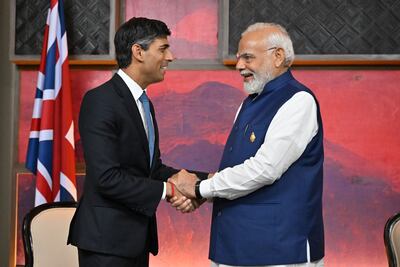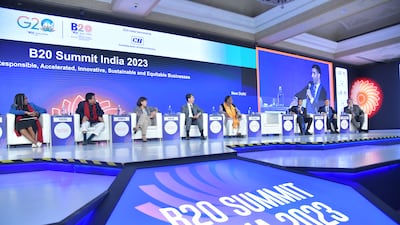Until recently, the pecking order of world economies was the US first, followed in order by China, Japan, Germany and UK.
Then, another country coming up fast usurped the UK’s position and it slipped to sixth. That growing economy was India. The most populous nation is on an upward path and will go higher still.
Its contribution to world trade is now expected to vie with China's within a few years.
It makes perfect sense, then, for the UK to seek to strike a trade deal with this rising force. Post-Brexit, there were supposed to be many such pacts, more than replacing what was lost with abandonment of the EU.
That was the claim, but it has not materialised. There have been some deals, most notably with Japan and Australia. But the big one, the US, has proved elusive. A partnership with India, though, with which the UK already enjoys traditional, close ties, would be a substantial fillip.
We’re told agreement is close. The Prime Minister's spokesman has cautioned, though, that it won't be sealed at the G20 summit in New Delhi next month. Among the UK industries that stand to benefit from a reduction in tariffs are Scotch whisky and cars.
What India, and Indians, want from ties with Britain
The talks between the two countries are entering their 13th round, that will see India pressing for the easing of restrictions on workers and students entering the UK. Those included would be nurses, care workers, IT professionals and financial consultants.
Given these would be temporary postings and the UK is short of staff and resources in these areas, it should not be a sticking point, not one that jeopardises the entire union.
Just at the point, though, that the finishing line is in sight, Labour has attempted to wave a red flag. The Prime Minister’s wife, Akshata Murty owns shares in Infosys, the giant international IT services and consultancy group co-founded by her father, Narayana.
Infosys, which has held contracts with British companies and the government, would like to make it easier for its consultants to work on large IT outsourcing projects in Britain. Infosys is already one of the biggest users of the visa system, applying for 2,500 permits in 2019, before the pandemic. The company would like to increase that number.
Labour maintains that Rishi Sunak stands to profit from the trade deal, via his wife, that he has a clear conflict of interest and he should be more transparent about her financial affairs.

They’ve found support from Alan Manning, a professor of economics at the London School of Economics, and chairman of the migration advisory committee from 2016 to 2020, who said: “As the Prime Minister’s family may have a direct financial interest in any deal on immigration, he should recuse himself from this part of the negotiations to avoid any perception of conflict of interest.”
You could be forgiven for supposing Akshata’s stake is huge. It is worth £500 million, but as a proportion of Infosys, it is nevertheless tiny, only 0.93 per cent. Her holding is also well-known. There is nothing secret about it. Sunak says he has informed the relevant authorities about the shares and has been told, apparently, that he does not need to include them in his entry on the register of MPs’ interests.
In any event, Labour’s call for greater openness of something that is open seems petty. It also has the ability to impair diplomatic relations, right at the moment they should be getting closer. Narayan is close to India’s fiercely nationalistic premier, Narendra Modi. The risk of throwing the whole agreement into doubt or, at the very least, further prolonging the protracted discussions, cannot be overstated.
The marriage will require Sunak’s sign-off, as Prime Minister. It will be Sunak shaking hands and having his photo taken with Modi when the pact is announced. Likewise, it will be Sunak heading the British delegation at the G20 and sitting in the same room as Modi and the other leaders and mixing with them at the various receptions. The notion that Sunak should somehow absent himself or reduce his role is meaningless.
A deal Britain needs, probably more than India
Let’s be clear: Britain needs this deal and probably more than India does. Of course, there is principle at stake but the idea that Sunak’s head is filled with how much the family coffers will be boosted as he and his colleagues examine the minutiae of the proposals is surely fanciful.
There is a bigger prize to be had, one that will benefit the whole country. It won’t do him any harm either as the general election approaches. Although now, presumably, Labour can be expected to poke away at him, using the seeming conflict as an excuse for highlighting his personal wealth.
It creates a nasty taste, one that suggests Labour is not above putting point-scoring ahead of what really matters for the nation.
Also, it smacks of Labour, which has been working hard to woo business, to convince Britain’s businesses it has their interests at heart, revealing another side, the one that existed in the past and has not gone away. It was hoping to go into the national ballot as having stolen the Tory mantle as the party of business. Well, not if it behaves in this fashion.
Labour should put the UK’s economic needs first and not make such a fuss.


